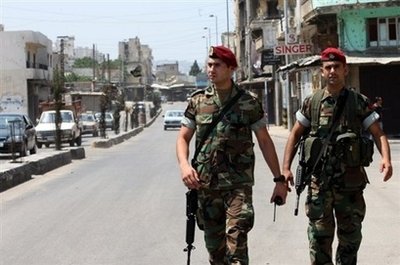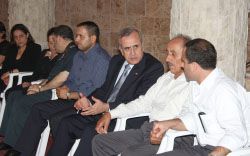By Hussein Abdallah, BEIRUT: President Michel Sleiman was quoted by his visitors on Sunday as denying that his Syrian counterpart, Bashar Assad, …
 CAIRO, Egypt (AP) -- It's the Mideast version of a sordid soap opera. A Lebanese pop star is brutally slain in her luxury Dubai apartment, her throat slashed. Arrested in her death: One of Egypt's most politically connected businessmen, accused of paying $2 million to have her killed.The killing of Suzanne Tamim has gone beyond a lurid crime story to something more serious -- a glimpse into the close links between Egypt's government and powerful business tycoons long viewed as above the law. It is also exposing strains between societies like Egypt's, where wealth and political power increasingly go hand in hand, and Dubai, which recently launched a high-profile push against corruption. People in the Arab world have long followed with fascination and moral clucking the tales of businessmen and politicians cavorting with actresses, belly-dancers and singers -- a sort of Hollywood Babylon in the conservative Muslim Middle East. But even by those standards, the Tamim drama is a stunner. The 30-year-old singer, famed for her striking green eyes, was found dead in her Dubai apartment in July, with multiple stab wounds and a 20-centimeter (8 inch) slash across her throat. This week, Egyptian authorities arrested real estate mogul Hisham Talaat Moustafa, said to be Tamim's former lover. For many, the surprise wasn't Moustafa's alleged involvement -- but his arrest. Egyptians are widely convinced their government won't touch influential businessmen. When Moustafa's name first appeared in media reports weeks ago, he denied a role and complained on Egyptian television that the rumors hurt the economy. The government promptly banned press reports on the slaying, suggesting that Moustafa was off-limits. The tycoon is a top ruling party official close to President Hosni Mubarak's powerful son, Gamal. In the past 10 years, he has become one of Egypt's top billionaires, the owner of luxury hotels and beach resorts and a leading force in building Western-style suburbs ringing Cairo for the upper-class.But on Tuesday, Egypt's public prosecutor accused the tycoon of contracting for the singer's killing by paying $2 million to Mohsen el-Sukkary, a former Egyptian state security officer.
CAIRO, Egypt (AP) -- It's the Mideast version of a sordid soap opera. A Lebanese pop star is brutally slain in her luxury Dubai apartment, her throat slashed. Arrested in her death: One of Egypt's most politically connected businessmen, accused of paying $2 million to have her killed.The killing of Suzanne Tamim has gone beyond a lurid crime story to something more serious -- a glimpse into the close links between Egypt's government and powerful business tycoons long viewed as above the law. It is also exposing strains between societies like Egypt's, where wealth and political power increasingly go hand in hand, and Dubai, which recently launched a high-profile push against corruption. People in the Arab world have long followed with fascination and moral clucking the tales of businessmen and politicians cavorting with actresses, belly-dancers and singers -- a sort of Hollywood Babylon in the conservative Muslim Middle East. But even by those standards, the Tamim drama is a stunner. The 30-year-old singer, famed for her striking green eyes, was found dead in her Dubai apartment in July, with multiple stab wounds and a 20-centimeter (8 inch) slash across her throat. This week, Egyptian authorities arrested real estate mogul Hisham Talaat Moustafa, said to be Tamim's former lover. For many, the surprise wasn't Moustafa's alleged involvement -- but his arrest. Egyptians are widely convinced their government won't touch influential businessmen. When Moustafa's name first appeared in media reports weeks ago, he denied a role and complained on Egyptian television that the rumors hurt the economy. The government promptly banned press reports on the slaying, suggesting that Moustafa was off-limits. The tycoon is a top ruling party official close to President Hosni Mubarak's powerful son, Gamal. In the past 10 years, he has become one of Egypt's top billionaires, the owner of luxury hotels and beach resorts and a leading force in building Western-style suburbs ringing Cairo for the upper-class.But on Tuesday, Egypt's public prosecutor accused the tycoon of contracting for the singer's killing by paying $2 million to Mohsen el-Sukkary, a former Egyptian state security officer.
 BEIRUT (AFP) - Anti-Syria parliamentary majority leader Saad Hariri has accused Syrian President Bashar al-Assad of trying to use unrest in north Lebanon to engineer a return to military control of the country, a statement received by AFP on Saturday said. "Those who export terrorism to north Lebanon do not have the right to fear the rise of extremism in Lebanon," Hariri said during Friday's Ramadan meal."(The Syrians) want to use the situation in Tripoli as a pretext to involve themselves in Lebanese affairs and use it as a means for their military and security return to Lebanon," the Future Movement chief said.Assad said on Thursday he had asked Lebanese President Michel Sleiman to urgently send more troops to northern Lebanon to combat what he called "extremism." "The Lebanese clearly remember who sent Fatah al-Islam to Nahr al-Bared and to the north and who has -- and continues to -- finance terrorist activities in other regions," Hariri's statement added. The Nahr al-Bared Palestinian refugee camp north of Tripoli was the scene of a deadly 15-week battle last year between the army and Fatah al-Islam, which adopted an ideology inspired by Al-Qaeda.
BEIRUT (AFP) - Anti-Syria parliamentary majority leader Saad Hariri has accused Syrian President Bashar al-Assad of trying to use unrest in north Lebanon to engineer a return to military control of the country, a statement received by AFP on Saturday said. "Those who export terrorism to north Lebanon do not have the right to fear the rise of extremism in Lebanon," Hariri said during Friday's Ramadan meal."(The Syrians) want to use the situation in Tripoli as a pretext to involve themselves in Lebanese affairs and use it as a means for their military and security return to Lebanon," the Future Movement chief said.Assad said on Thursday he had asked Lebanese President Michel Sleiman to urgently send more troops to northern Lebanon to combat what he called "extremism." "The Lebanese clearly remember who sent Fatah al-Islam to Nahr al-Bared and to the north and who has -- and continues to -- finance terrorist activities in other regions," Hariri's statement added. The Nahr al-Bared Palestinian refugee camp north of Tripoli was the scene of a deadly 15-week battle last year between the army and Fatah al-Islam, which adopted an ideology inspired by Al-Qaeda.
A statement issued by the ruling majority on Thursday night said Assad has no right to ask the Lebanese president to send Lebanese army units to northern Lebanon, and such a request is an "interference in Lebanese internal affairs, and result from non-recognition of Lebanon's sovereignty and independence."
The statement also said such an request is "an insult to Lebanese president." Assad Thursday said at a press conference that he had told the Lebanese president during the latter's visit to Damascus to send more troops to northern Lebanon to stop clashes between Sunnis and Alawites in Tripoli and some villages of Akkar province. During the past three months, clashes between the two sects in northern Lebanon have left more than 23 people killed and hundred others wounded. Meanwhile, Assad's invitation for talks with Israel was also rejected by the Lebanese ruling coalition, saying "Lebanon will be the last country to sign settlement agreement with Israel after reclaiming Arab rights."
 Daily Star - BEIRUT: Lebanese President Michel Sleiman and newly appointed commander of the Lebanese Armed Forces General Jean Kahwaji offered condolences on Saturday to the family of First Lieutenant Samer Hanna, who was killed when his helicopter was hit by Hizbullah gunfire on Thursday. Hanna's helicopter was shot at during a training session in the Sejod Hills in Southern Lebanon, a region known to be a Hizbullah stronghold. Sleiman and Kahwaji paid separate visits to Hanna's family at their residence in the northern town of Tannourine. The army officer was laid to rest on Friday. Meanwhile, judicial authorities on Saturday continued to investigate the Thursday's incident after Hizbullah handed over the assailant and said that the incident had been the result of "confusion."
Daily Star - BEIRUT: Lebanese President Michel Sleiman and newly appointed commander of the Lebanese Armed Forces General Jean Kahwaji offered condolences on Saturday to the family of First Lieutenant Samer Hanna, who was killed when his helicopter was hit by Hizbullah gunfire on Thursday. Hanna's helicopter was shot at during a training session in the Sejod Hills in Southern Lebanon, a region known to be a Hizbullah stronghold. Sleiman and Kahwaji paid separate visits to Hanna's family at their residence in the northern town of Tannourine. The army officer was laid to rest on Friday. Meanwhile, judicial authorities on Saturday continued to investigate the Thursday's incident after Hizbullah handed over the assailant and said that the incident had been the result of "confusion."
News reports Sunday quoted Defense Minister Elias Murr as telling a Cabinet session on Friday that Hizbullah fighters could have mistaken the Lebanese helicopter for an Israeli one. The reports quoted Murr as saying the helicopter's ID plate had a different color than the plates of the army's traditional helicopters, adding that Hizbullah fighters had rushed to help Hanna and his wounded comrade when they realized that the targeted helicopter belonged to the Lebanese Army. The helicopter had recently been donated by the United Arab Emirates to the Lebanese Armed Forces, the reports added. Hizbullah's second in command, Sheikh Naim Qassem, told Al-Manar television on Friday that the incident was surrounded by confusion. Qassem said that Hizbullah would abide by whatever the army and judicial investigators said in the matter. Meanwhile, Interior Minister Ziyad Baroud told Voice of Lebanon radio on Saturday that he wanted to hear an explanation rather than a justification for Thursday's attack. "We are seeking an explanation not a justification for what happened ... such explanation will be provided through judicial investigations and not political interpretations," the minister said.
Khazen History


Historical Feature:
Churches and Monasteries of the Khazen family

St. Anthony of Padua Church in Ballouneh
Mar Abda Church in Bakaatit Kanaan
Saint Michael Church in Bkaatouta
Saint Therese Church in Qolayaat
Saint Simeon Stylites (مار سمعان العامودي) Church In Ajaltoun
Virgin Mary Church (سيدة المعونات) in Sheilé
Assumption of Mary Church in Ballouneh
1 - The sword of the Maronite Prince
2 - LES KHAZEN CONSULS DE FRANCE
3 - LES MARONITES & LES KHAZEN
4 - LES MAAN & LES KHAZEN
5 - ORIGINE DE LA FAMILLE
Population Movements to Keserwan - The Khazens and The Maans
ما جاء عن الثورة في المقاطعة الكسروانية
ثورة أهالي كسروان على المشايخ الخوازنة وأسبابها
Origins of the "Prince of Maronite" Title
Growing diversity: the Khazin sheiks and the clergy in the first decades of the 18th century
Historical Members:
Barbar Beik El Khazen [English]
Patriach Toubia Kaiss El Khazen(Biography & Life Part1 Part2) (Arabic)
Patriach Youssef Dargham El Khazen (Cont'd)
Cheikh Bishara Jafal El Khazen
Patriarch Youssef Raji El Khazen
The Martyrs Cheikh Philippe & Cheikh Farid El Khazen
Cheikh Nawfal El Khazen (Consul De France)
Cheikh Hossun El Khazen (Consul De France)
Cheikh Abou-Nawfal El Khazen (Consul De France)
Cheikh Francis Abee Nader & his son Yousef
Cheikh Abou-Kanso El Khazen (Consul De France)
Cheikh Abou Nader El Khazen
Cheikh Chafic El Khazen
Cheikh Keserwan El Khazen
Cheikh Serhal El Khazen [English]
Cheikh Rafiq El Khazen [English]
Cheikh Hanna El Khazen
Cheikha Arzi El Khazen
Marie El Khazen